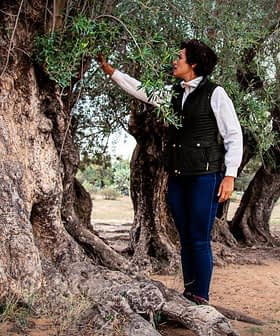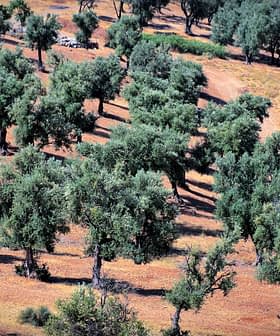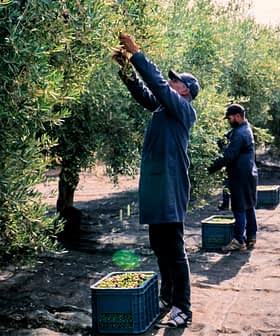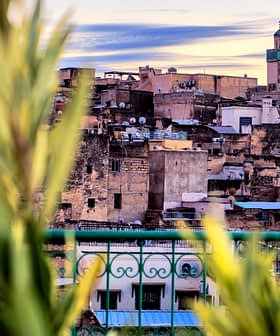The Aqallal Family, Atlas Olive Oils
The Aqallal family in Morocco has been producing award-winning olive oil since 1887, with their Desert Miracle evoking the challenging conditions of the Atlas Mountains where their olive trees grow. They produce over a million liters of extra virgin olive oil annually under different brand names, utilizing advanced technologies and sustainable practices to ensure high-quality products.

The Aqallal family has been producing olive oil in the foothills of the Atlas Mountains in Morocco since 1887, winning more awards than any other producer in the region along the way. The Atlas chain of mountains, about 1,500 miles long, stretches across Morocco, Algeria, and Tunisia, separating the Atlantic and Mediterranean from the Sahara desert. Desert Miracle, one of the Aqallal’s premium extra virgin olive oils, evokes the very trying conditions under which their olive trees grow.
Atlas produces over a million liters of olive oil a year, all of it extra virgin, under the brand names Les Terroirs de Marrakech, Desert Miracle, and Arabesque. All work is done on the estates, from cultivation and harvest to bottling and packaging. The amount of time between harvest and extraction can be as little as 20 minutes, and the olive oils have a very low acidity level of between 0.1 and 0.2 percent.
 The Aqallal’s are quick to adopt technologies and best practices from all over the world. Israeli drip irrigation systems are used to parcel out the water, Atlas Mountains snowmelt, contained in artesian wells. They have built Morocco’s first covered water basin, covered so as to avoid evaporation from the sun, using German pumping technologies. In the interest of water retention, they have imported tons of volcanic rock from Latin America to mix into their earth. Most of their groves are high-density and Atlas has hired Spanish consultants to work out the design. Atlas cultivates 600 hectares (1483 acres) of olive orchards on their three estates: the Marrakech, El-Borouj, and the Beni-Mellal Olive Estates.
The Aqallal’s are quick to adopt technologies and best practices from all over the world. Israeli drip irrigation systems are used to parcel out the water, Atlas Mountains snowmelt, contained in artesian wells. They have built Morocco’s first covered water basin, covered so as to avoid evaporation from the sun, using German pumping technologies. In the interest of water retention, they have imported tons of volcanic rock from Latin America to mix into their earth. Most of their groves are high-density and Atlas has hired Spanish consultants to work out the design. Atlas cultivates 600 hectares (1483 acres) of olive orchards on their three estates: the Marrakech, El-Borouj, and the Beni-Mellal Olive Estates.
The Marrakech Estate is where the fifth generation of Aqallals lives. This is where they produce Les Terroirs de Marrakech, an olive oil made from the French cultivar Picholine du Languedoc.
The olives are both centenary and newly planted and are also kept separate in extraction and bottling. The estate produces some 25,000 liters from the old trees, with each of the 3,000 trees producing about 60 kg of fruit. The new 398,180 trees, in high-density plantings, each produce about 6 kg of fruit for a total of 450,000 liters. In 2009, the oil received the 3rd place award in the International Olive Council Mario Solinas Quality Awards in the green fruitiness category. In both 2009 and 2010, the oil received the gold medal at London’s Great Taste Awards.
Desert Miracle is produced on the El-Borouj Olive Estate. Of the three estates, this is at the lowest elevation of 320 m, and also the most arid. The olive cultivars used are the Spanish Arbequina (97%) and the Moroccan Dahbia (3%). Atlas produces 330,000 liters of what they call their “ultra premium extra virgin olive oil.” In 2009 Desert Miracle won a gold medal for the medium Arbequina category at the Los Angeles’s International Olive Oil Competition.
Arabesque is produced on the Beni-Mellal Olive Estate. The olives used are the Spanish cultivars Arbequina ( 73%) and Arbossana (18%), together with the Greek Koroneiki (9%), to produce 374,000 liters.
“To make the best extra virgin olive oil in Morocco is a great honour for us and a high responsibility,” Othmane Aqallal wrote to Olive Oil Times. “It’s a challenge we face every day because we believe in the value of our workforce and in the good quality of the fruits of our terroir. You only produce “gran cru” olive oil from high quality olives that are fresh, clean and healthy. It is a pure fruit juice! You then become obsessed by quality, aromas, flavors. It penetrates your body, your everyday life. We were proud to sustain a family tradition since 1887.”
.
Each year, Olive Oil Times commends the achievements of olive oil producers who make an outstanding contribution to the industry. These individuals or companies set the standards of excellence for the rest of the industry to follow and influence the quality, variety, value, and educational information available to olive oil consumers.
Often these leaders have overcome formidable and enduring challenges, or through innovation found new ways to advance olive oil quality in a product range, in their community or throughout the world.
With an eye to the past we recognize the olive oil maker who has managed to preserve or promulgate olive oil’s cultural legacy. Looking to the future, we’re honoring the producer who works to ensure the place of olive oil in our lives and those of generations to come.
The Olive Oil Times Producer of the Year award may be bestowed upon an entire organization or a particular olive oil maker. This recognizes the fact that producing olive oil can be both a collaborative endeavor involving many hands and an individual expression of personal creativity.





